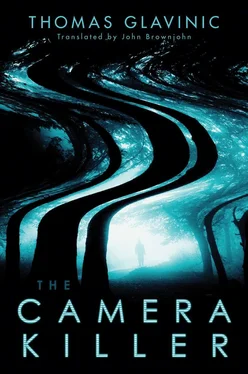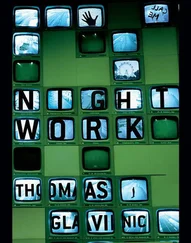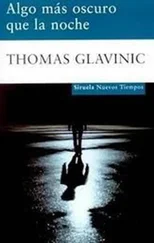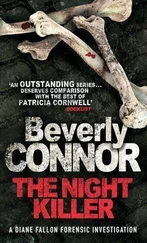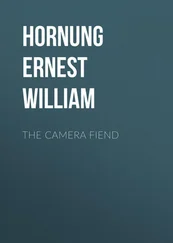Scarcely had we eaten a few mouthfuls when the News in Pictures program began, accompanied by even more dramatic background music than usual. With the exception of the weather and sports, all the headlines and forthcoming reports related to the murders in West Styria. The federal president was shown, captioned: “President.” A helicopter shot of the victims’ hometown: “Noose around Killer Tightens.” Pictures of weeping men and women: “Horror-struck.” Then the presenter introduced the program. All the facts were recapitulated.
Heinrich pointed out that if the killer were a local man (which the report did not, at least, exclude), he might well be in the vicinity. We should bear that in mind, he said. My partner shushed him for fear of missing something, but she then said she dreaded to consider such a possibility. Half in jest, she advised Heinrich to make sure the front door was locked. With an inscrutable expression, he said it was. Eva had checked, and it was double locked.
Heinrich turned the sound down. He thought it unlikely that the killer, if he were an outsider, would be in the vicinity. Even if he were, he would hardly come here, not even if he was a local man.
My partner said he seemed to doubt his own words; the look on his face gave him away.
Heinrich admitted to feeling uneasy, but there was no danger. There were four of us, including two men — we would make mincemeat of the fellow. Besides, the farmer next door might be elderly, but he was tough and strong. The murderer was welcome to come, he said. When my partner pointed out that he was presumably a psychopath, and one could never tell what one was up against and what such a person was capable of, Heinrich brushed this aside with a belligerent gesture and said that no amount of insanity would be proof against the sturdy arms of those present.
My partner asked what would happen during the night. What if the killer managed to sneak in unobserved while our sturdy arms were relaxing? Heinrich asked if she was genuinely frightened. Not frightened, exactly, my partner replied, but she didn’t feel too good.
Heinrich contrived to cheer her up by jocularly assuring her that he and I would take turns to stand guard. He turned the sound up again.
A report on the demonstrations outside the commercial station was just in progress. The transmission of the video was irrevocably scheduled for 11:30 p.m. The presenter mentioned that German politicians had appealed for calm and asked the station to practice restraint. This had failed to have the desired effect on those in charge. Someone — Heinrich coughed just as his name was mentioned, so I missed it — had called for a ban on the transmission, but this too had come to nothing for various reasons.
A spokesman for the TV channel had stated that, although they had the deepest respect for the victims’ family and the dead children themselves, the transmission was essential in order to acquaint the public with the full extent of the tragedy. It would be wrong to allow a potential ban to sweep the details under the carpet. The broadcasters refused to be intimidated by threats.
They’re talking bullshit, Heinrich exclaimed.
The News in Pictures presenter stated that Austrian Broadcasting dissociated itself from such methods and would confine itself to showing a photograph of the victims. The children appeared for the first time. They had a black bar over their eyes, and the photograph was grainy and out of focus. The caption at the foot read, “Franz (seven)” and “Josef (eight).”
This is terrible, Heinrich exclaimed, quite terrible. My partner indignantly agreed. Eva, with her eyes fixed on her plate and a last forkful of spaghetti in her hand, said she meant what she’d said: If this video were televised, all hell would break loose.
What did she mean? inquired my partner.
Heinrich called for silence; the president was coming. Sure enough, the federal president was shown delivering a brief address. The occupants of the living room accompanied it with tokens of disapproval and offensive remarks about the head of state. While a majority of those present were still accusing him of being a disagreeable individual, the studio called its correspondent in West Styria.
The nature of the situation there hadn’t changed. The local correspondent, looking down on the crowded main square, commented on this as follows: “Public sentiment is at boiling point.” She reported that the bishop of the Graz-Seckau diocese had gone to see the bereaved family an hour earlier. Scheduled for 11:30, doubtless as a mark of disapproval aimed at the abhorrent video transmission, was a memorial service that senior ecclesiastical dignitaries and members of the government were expected to attend.
Meantime, some eight thousand to ten thousand people had converged on a town whose population normally numbered only eight hundred. There was a never-ending stream of cars and buses, camera crews, journalists, and garden-variety rubbernecks. The parish priest, who spoke last, said that God had shut his eyes to them.
Back in the studio, the woman presenter announced some program changes occasioned by current events. At 8:15, there would be a live report from the hard-hit West Styrian town. Thereafter, at around 9:00 p.m., a program on the psyche of murderers first transmitted nine months earlier, and at 10:00 p.m., the Easter Vigil service from St. Stephen’s Cathedral in Vienna.
Finally, the commentary turned to the killer. He was around six feet and had dark hair and dark eyes. You bet some viewers will now be shouting that he’s a foreigner, said Heinrich.
The presenter: According to the testimony of the boy who escaped, he was roughly thirty years old. However, she went on, experts considered this information unreliable because children possess only a limited ability to estimate an adult’s age. Ergo, the man might equally be twenty or forty-five. Two different forensic sketches were shown again. One had been based on the testimony of the surviving child, the other on that of a farmhand who claimed to have spotted a man near the murder scene.
Heinrich said they were as alike as Michael Jackson and Oliver Hardy.
The presenter: The trail wasn’t red-hot, but there were some promising leads; that was all that had filtered through the Ministry of the Interior’s news blackout.
A new picture appeared beside her. It showed a cordoned-off clearing in the forest, together with some policemen in uniform or scene-of-crime vests. A timetable was inserted. The presenter reported that, on the morning of the day of the murders, an unknown man had captured three children in a forest near the small West Styrian town of Frauenkirchen. In the course of several hours, during which he interviewed them in front of a video camera, two terrible crimes occurred, in addition to the torching of a hay barn. By means of threats and appalling psychological intimidation, the man had induced two of the three boys to throw themselves off tall trees, as a result of which both had died. The third had managed to escape in an unusual manner.
Having questioned him long and exhaustively about his emotional response to the death of his brothers, the killer had offered him a choice. He himself would shut his eyes and count up to a hundred. The boy was at liberty to run away during that time. If he decided to escape, the man would pursue him and, if he caught him, kill him in an extremely brutal fashion, ripping out his nails and flaying him alive, etc. If he failed to catch him, he would turn up on a certain day in the fall and exterminate the boy’s entire family, him included. If the boy decided to stay, on the other hand, the man promised him a quick and painless death and his parents’ lives would be spared.
The man closed his eyes and began to count slowly. The boy ran off.
Читать дальше
